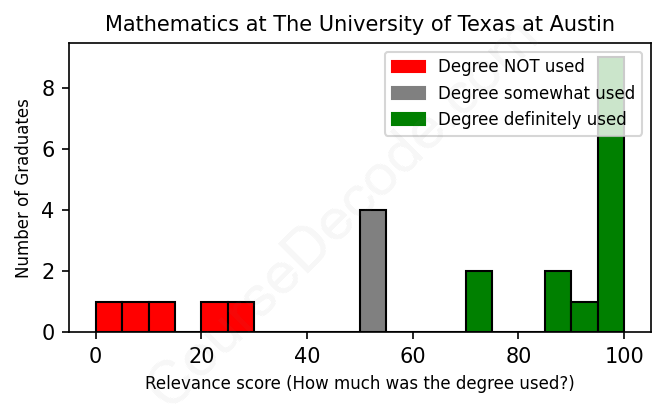
First, some facts. Of the Mathematics graduates from The University of Texas at Austin we've analyzed , here's how many have used (or NOT used) their degree in their career:

These are estimates based on AI analysis of 23 LinkedIn profiles (see below).
The verdict? Slightly above average. Overall, with an average relevance score of 68%, Mathematics graduates from The University of Texas at Austin have a slightly higher likelihood (+1%) of finding work in this field compared to the average graduate across all fields:
And for comparison, here's the chart for all profiles we've looked at across all degrees.
Also, after graduating, only 34% of these graduates have pursued further education other than another Bachelor's degree (such as a Masters degree or other), compared to the average across all profiles of 35%. This suggests a Bachelors degree is enough for most Mathematics graduates, and it's normal to look for work straight after graduation.
See the details:
|
Relevance score: 50% We think this person has gone into a career only somewhat relevant to their degree. We think this person has gone into a career only somewhat relevant to their degree.
DEGREE INFOGraduated in 2021 from The University of Texas at Austin with a Bachelor's degree in Mathematics. No other secondary education since. JOB HISTORY SINCE GRADUATIONRoute Analyst Texas Disposal Systems Dec 2021 - Present ABOUTStudied mathematics at the University of Texas at Austin and completed a certificate in computer science. Proficient in basic Python 3 skills and object-oriented programming.I am currently working at Texas Disposal Systems as a Route Analyst. I utilize GIS software to create routes that are time and cost efficient. I work on multiple projects at once and collaborate with system managers weekly. |
The top 10 most common jobs done by the graduates we've analyzed (ranked most common to least) are:
When you look at the career paths of people who graduated with a Mathematics degree from The University of Texas at Austin, you'll notice that a lot of them ended up in positions that heavily involve data analysis, teaching, and even software development. Roles like Data Analyst, Data Scientist, and even positions in the education sector like mathematics teacher are quite common. These jobs make great use of the mathematical concepts and analytical skills they learned in school. For instance, Data Analysts at companies like 3M and Discover Financial Services apply statistical methods and problem-solving techniques daily, making their roles very relevant to their degrees.
However, not every job on the list is directly related to mathematics. There are roles like Customer Support Analyst or even positions in management and human resources that might tap into problem-solving skills but don’t necessarily require a deep understanding of math. Some graduates have veered away from math-centric roles entirely, like those in customer service or marketing. Overall, while many graduates find jobs that directly connect to their mathematics education, there are also a significant number that have chosen paths where their math background is less of a focus. So, it's a mixed bag, but it's clear that a degree in Mathematics can lead to some pretty diverse opportunities!
Here is a visual representation of the most common words in job titles for Mathematics graduates (this is across all Mathematics graduates we've analyzed, not just those who went to The University of Texas at Austin):

Graduates with a Mathematics degree from The University of Texas at Austin generally pursue a variety of career paths, many of which align well with their quantitative skills. Right after graduation, a lot of these individuals tend to start in positions like data analysts, teachers, or roles in consulting. For example, some graduates landed jobs as data analysts at major companies or took up teaching positions—roles that clearly draw upon their mathematical training. Over the first few years, many of these graduates have moved into more responsibility with job titles like senior data analyst or software developers, which shows a progression in their careers that often leads to more specialized and higher-paying positions.
Looking at the five to ten year mark, it seems like many of these individuals have continued to thrive in industries closely related to Mathematics. Some have become established professionals in tech as software engineers, while others have taken an academic route becoming professors or researchers. Even those who ventured into fields less direct—like consulting or project management—often find their math skills serve them well. That said, there are also some graduates who have veered into fields somewhat unrelated to Mathematics, such as customer service or general business roles. Overall, though, many alumni have successfully leveraged their degrees into rewarding careers that utilize their mathematical abilities, demonstrating the versatility and value of a Mathematics degree.
Hey there! So, tackling a Bachelor's degree in Mathematics at The University of Texas at Austin—or really anywhere—can be pretty challenging, but it really depends on your vibe with math. UT Austin has a solid reputation and the coursework can get pretty rigorous, especially with proofs and advanced concepts. If you're someone who enjoys problem-solving and has a good handle on abstract thinking, you might find it manageable and even fun! On the flip side, if math has never been your thing, you might feel a bit overwhelmed by the depth and pace of the classes. Generally speaking, it's considered tougher than average, but if you're passionate about it and willing to put in the work, you can definitely get through it. Just make sure to stay on top of your studies and seek help when you need it!
Most commonly, in the LinkedIn profiles we've looked at, it takes people 4 years to finish a Bachelor degree in Mathematics.
When you look at the job history of these math grads from UT Austin, it seems like a mixed bag in terms of how much money they're making. Those who pursued analytics, data science, and tech roles—like the folks at Amazon, Meta, and Goldman Sachs—are likely pulling in some solid salaries, especially as they climb the ladder into senior positions. But then you've got others who are in teaching roles or administrative positions, which typically don’t pay as well. For example, teachers in general don’t make as much as someone in a corporate data position. Overall, while some of these graduates are probably doing pretty well financially, others might not be making quite as much—it's really dependent on the specific career path they chose after college.
Here is a visual representation of the most common words seen in the "about" section of LinkedIn profiles who have a Bachelor degree in Mathematics (this is across all Mathematics graduates we've analyzed, not just those who went to The University of Texas at Austin). This may or may not be useful:

Here are all colleges offering a Bachelor degree in Mathematics (ordered by the average relevance score of their Mathematics graduates, best to worst) where we have analyzed at least 10 of their graduates:
| College | Score | Count |
|---|---|---|
 University of Florida University of Florida
|
83 | 11 |
 Penn State University Penn State University
|
74 | 13 |
 The University of Texas at Austin The University of Texas at Austin
|
68 | 23 |
 University of Washington University of Washington
|
68 | 27 |
 University of California, Berkeley University of California, Berkeley
|
66 | 10 |
 University of Minnesota-Twin Cities University of Minnesota-Twin Cities
|
65 | 15 |
 California Polytechnic State University-San Luis Obispo California Polytechnic State University-San Luis Obispo
|
64 | 11 |
 University of North Texas University of North Texas
|
51 | 11 |
 University of California, Riverside University of California, Riverside
|
44 | 11 |